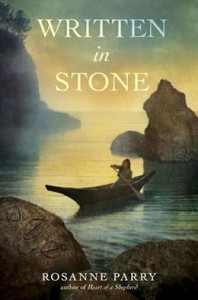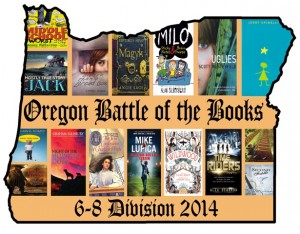A few years ago my children’s school district faced a catastrophic shortfall in their budget. The cuts that followed were many and painful, among them the loss of every single certified teacher librarian in the largest school district in Oregon. Fortunately our funding crisis is over and we’re in the happy position of deciding how to expand services. After some very eloquent 5th graders testified to the frustration of going to the school library only to find the door locked, I added some observations as a former student, a parent, a 20 year volunteer, and a visiting author.
What I had to say may be applicable to your home school district so if you are fighting this battle in some other place, please feel free to borrow my words. If you are a parent or student in the Beaverton School District, you have one more chance to make your voice heard at a budget meeting at 6:30pm on the 20th of this month at school district headquarters.
Here are my thoughts on why my own school district needs a certified teacher-librarian in every school.
1.Teacher support
As a visiting author I am in hundreds of schools all over the country. I work with grade school, middle, and high school teachers to encourage reading and writing and generate excitement for literature. Everywhere I go I meet English and reading teachers who are genuinely excited to do the higher level reading work that new standards ask of them. They want to delve deeper into texts of all genres. They are excited to bring students the best and most current books. But not every book stands up to higher level reading. The Wimpy Kid franchise, for example, is not up to the task. In order to find the books that will bear greater scrutiny and model the best and most elegant use of language, you’d have to read several hundred books each year. It’s wildly impractical to ask every single English and reading teacher to do this every year.
A certified teacher librarian is the person well qualified to winnow the enormous variety of current books to the 30 or 40 strongest candidates so that each teacher can choose from among the best of the best. They are also the ones with the resources to help teachers find books available in translation, audio, and ebook to accommodate the needs of a diverse population.
2. Loss to private schools
There are dozens of private schools within Beaverton’s boundaries. All of them have full time teacher-librarians, and that is a huge draw. It was not always so. When my parents were choosing between public and parochial schools for me they looked at the options and saw, on the one hand, a parochial school that would see to my spiritual development and had significantly smaller class sizes, and on the other hand, a public school with a well funded library and a full time librarian. They chose public schools. The parochial schools in the area are expanding, and we stand to lose high achieving students and highly involved parents if we don’t provide school libraries. Having been in several Catholic schools over the last five years, I’ve seen relatively small libraries with limited technology. But they have a full time teacher librarian and children have full access to that smaller collection. The Beaverton school district libraries far exceed most private schools in the size and quality of the collection but that vital asset is currently behind a locked door.
3. Supporting growing diversity.
Our school district has recently become a majority non-white district. This coincides with a moment when publishers are highly motivated to publish titles with multicultural characters. Looks like a win-win situation. But if nobody is there to buy the books with non-white characters, publishers will stop making them. There is a huge need for kid’s books with non-white characters. At the moment, 90% of titles have a white protagonist. That’s a ridiculous figure and the only reason it’s true is that those books consistently sell. In order for an authentic body of literature to take root for the young readers we have today is for well funded school libraries to buy the books that reflect their populations, and make sure that kids find the books that mirror their own experience and speak to their own values. We could make a huge difference in providing a legacy of inclusive literature for children.
4. Supporting family literacy
One of the things I’ve seen in talking to immigrant students, not just in Oregon but all over, is that for many of them the school library is their only library. Whether the issue is transportation or fear of library fines or reluctance to register an address publicly, lots of kids only have access to free books through a school library. One of the strongest factors in predicting whether a child will read on grade level is access to books in the home. Our families no matter how poor or disadvantaged want to support their children’s reading. By keeping the school library behind a locked door, we deny them the number one tool in learning to read: books!
A fully funded and staffed school library supports literacy better and more efficiently by enabling the student and parent to do their share of the work. With English language learning families we have a golden opportunity in the years when parents are motivated to read aloud to their children. A teacher-librarian is in the position to put into the hands of these families the books and audio books that will, not only support the child, but lift the literacy of the parent. Then we have both higher performing students and more empowered and engaged parents–a win for the entire community.
Please consider testifying in support of fully funded and staffed libraries at the Beaverton School District Administration Center at 6:30 on Monday April 20th. 16550 SW Merlo Road, Beaverton, OR 97003.
If you are not in the Beaverton School District I hope you will consider advocating for school librarians in your home district.





